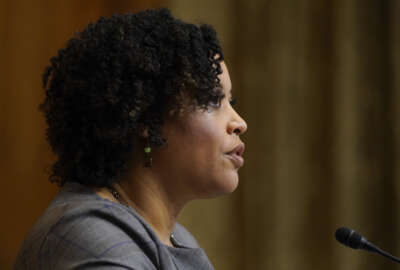House Democrats urge OMB to step up demographic data collection efforts
House Oversight and Reform Committee Chairwoman Carolyn Maloney (D-N.Y.) and Rep. Ayanna Pressley (D-Mass.) urged the Biden administration to create the "instit...
A top-ranking House Democrat is giving the Office of Management and Budget an extra nudge to make demographic data collection within the federal government more of an urgent government priority.
Without better data on the members of the public using government services, agencies can’t make much progress on a January executive order on racial equity and underserved communities, House Oversight and Reform Committee Chairwoman Carolyn Maloney (D-N.Y.) and Rep. Ayanna Pressley (D-Mass.) said Friday in a letter to OMB.
“We applaud the Biden-Harris Administration’s bold efforts to address longstanding structural inequities rooted in our nation’s historical and ongoing legacy of systemic racism, which have been laid bare by the coronavirus pandemic,” they wrote in their letter to acting OMB Director Shalanda Young and Ambassador Susan Rice, director of the White House Domestic Policy Council.
“Progress toward equity cannot be sustained without the federal government’s commitment to and development of institutional infrastructure to overcome historical injustices at scale,” they added.
Their letter comes on the heels of an OMB report this summer that shed light on the challenges agencies in face in collecting demographic data about who’s using their services.
OMB found agencies generally don’t have the data needed to understand how they serve the public across various demographics.
And while many agencies have an abundance of administrative data about their programs, they often lack the tools or the skills to use that information in an actionable way. In other cases, agencies aren’t collecting demographic data for privacy or legal reasons, or the data they do have is of low quality.
“Without access to crucial demographic data such as race, ethnicity, disability and income, agencies cannot properly identify barriers to equity or develop meaningful plans to remove these barriers,” Maloney and Pressley said.
A White House Interagency Working Group on Equitable Data, which the order established, will help, Maloney and Pressley said.
But they urged the administration to do more.
“While equitable data practices are necessary to achieve equitable outcomes, such practices alone are not sufficient,” Maloney and Pressley said. They urged the administration to help agencies develop accurate equity assessments and expand the scope of their efforts to engage with stakeholders and members of the public.
“The more community members are engaged in the administration of agency programs and policies, the more likely it is that all voices will be heard as part of equitable decision-making across the federal government,” Maloney and Pressley wrote.
The order, which President Joe Biden signed on his first day in office, charged agencies with assessing the state of equity within their organizations, operations and external-facing public services. Those assessments were due in August, and agencies have until January to detail their plans for improving the equity of the services they provide to the public, particularly those with a high impact.
Federal agencies have said they face similar challenges in implementing another Biden executive order, which charged agencies with improving diversity, equity, inclusion and accessibility internally within their own workforces.
Biden administration officials have said the two orders go hand-in-hand — and that agencies can’t realize much progress on improving diversity, equity, inclusion and accessibility within their external, public-facing services without a diverse federal workforce to implement those programs.
The concept of collecting more demographic data has sparked some debate in Congress in recent weeks.
Democrats on the House Veterans Affairs Committee have a new draft bill, which would require VA to collect a wide variety of information from veterans about their race, ethnicity, religion, tribal affiliation, sexual orientation, gender identity and preferred pronouns, among other details.
Democrats say VA consistently cites a lack of data in responding to the committee’s questions, and members, citing Biden’s racial equity order, believe the bill would give the department a better understanding of the veterans they serve.
“The VA needs to adopt a comprehensive data-driven approach to evaluating gaps in access to care and benefit usage,” Rep. Anthony Brown (D-Md.) said last week. “Without collecting demographic data, the VA is left relying on anecdotal evidence to inform their policies.”
But Republicans blasted the draft in a legislative hearing last week, arguing the bill would duplicate VA’s existing data collection efforts and infringe on veterans’ privacy rights. They also pressed VA on the legality of collecting details about a veteran’s religious affiliation,
The department said it already collects some demographic data when it establishes veterans as new beneficiaries but agreed it could better organize and use that information to make strategically-driven decisions.
Copyright © 2024 Federal News Network. All rights reserved. This website is not intended for users located within the European Economic Area.
Nicole Ogrysko is a reporter for Federal News Network focusing on the federal workforce and federal pay and benefits.
Follow @nogryskoWFED





